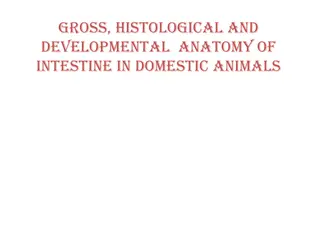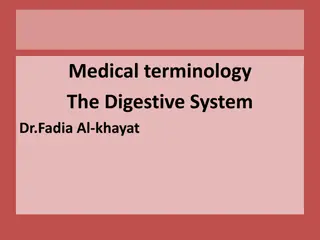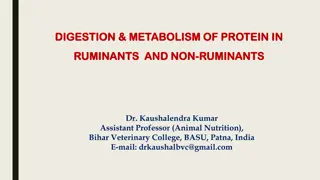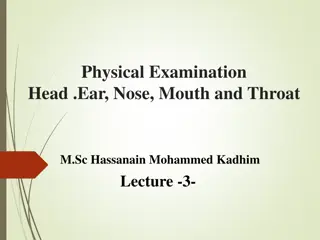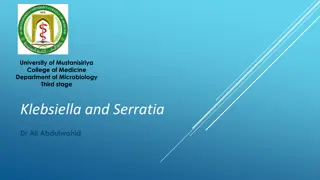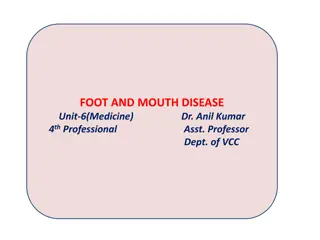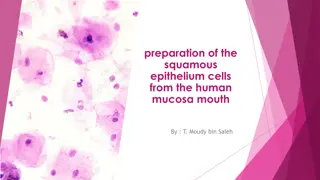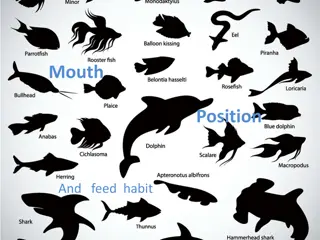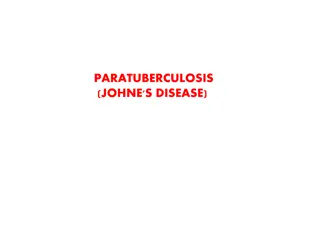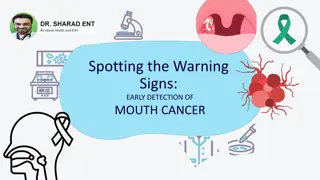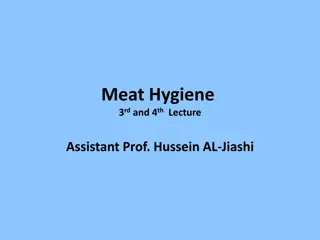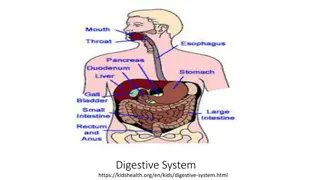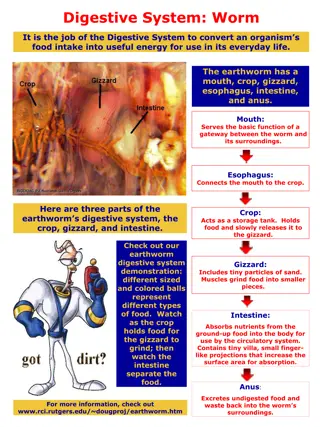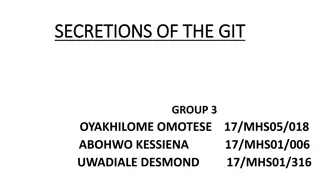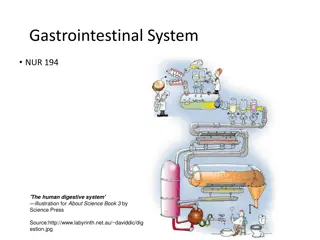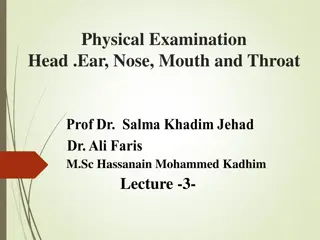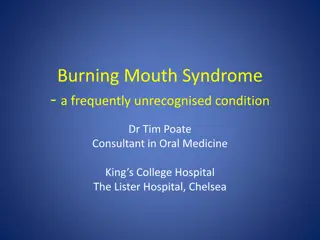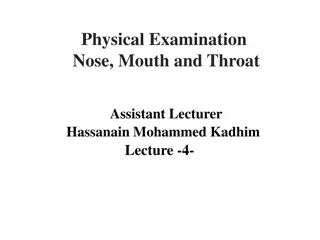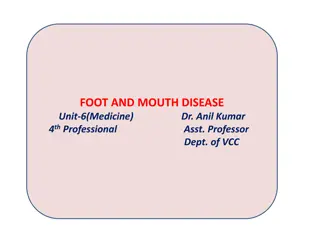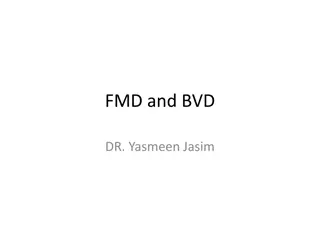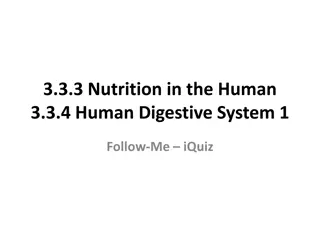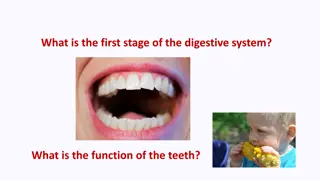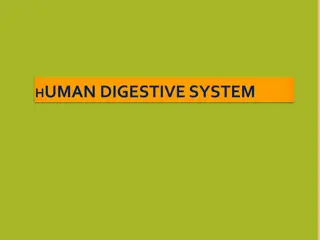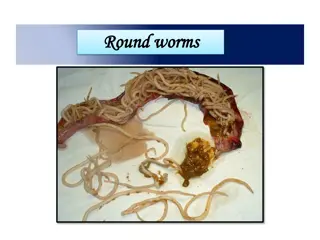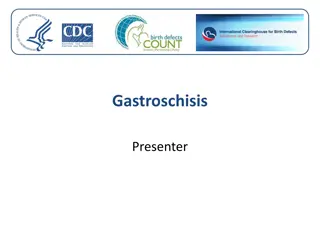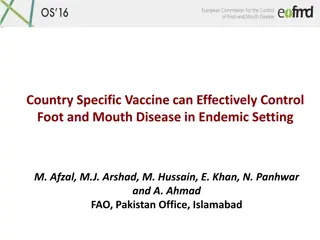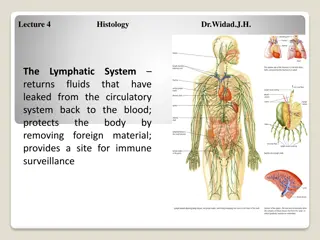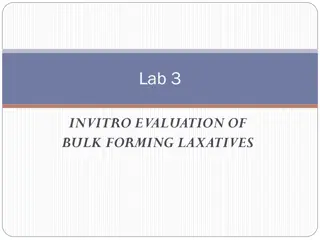Anatomy of Intestine in Domestic Animals
The intestine in domestic animals plays a vital role in digestion and absorption. It consists of the small intestine for chemical digestion and absorption and the large intestine for water absorption and excretion. This article covers the gross anatomy, histology, and embryology of the intestine, de
2 views • 84 slides
Understanding the Digestive System: Medical Terminology Overview
The digestive system, comprising the gastrointestinal tract (GIT) and accessory organs, plays a vital role in digestion. From the upper GI tract (oral cavity, esophagus, stomach) to the lower GI tract (small and large intestines), each part has specific functions. Understanding salivary glands and c
0 views • 18 slides
Protein Digestion and Metabolism in Ruminants and Non-Ruminants
Digestion and metabolism of protein in both ruminants and non-ruminants involve enzymatic breakdown of proteins into polypeptides and amino acids in the stomach and intestines. Key enzymes such as pepsin, trypsin, and chymotrypsin play important roles in protein digestion. Gastric digestion in the s
3 views • 14 slides
Comprehensive Examination of Head, Ear, Nose, Mouth, and Throat
Learn how to safely and accurately conduct a thorough examination of the head, ear, mouth, nose, and throat, document assessment data, identify problems, and address client's concerns. The examination covers aspects such as symmetry, shape, scalp inspection, palpation, face inspection including colo
0 views • 29 slides
The Digestive Journey: From Skittles in the Mouth to Nutrient Absorption in the Intestine
The process begins with chewing skittles in the mouth, where salivary amylase breaks down sugar. The bolus then travels down the esophagus via peristalsis into the stomach, further broken down by gastric juice. The pancreas releases enzymes like amylase and lipase to digest sugars and fats. Bile pro
1 views • 15 slides
Klebsiella Species: Characteristics and Pathogenicity
Klebsiella species, such as K. pneumoniae and K. oxytoca, are gram-negative bacilli commonly found in the microbiota of the intestines, nasopharynx, and feces. They exhibit distinct characteristics like pink mucoid colonies on MacConkey's agar and are known to cause both community-acquired and hospi
0 views • 24 slides
Foot and Mouth Disease: Overview, Symptoms, and Sequelae
Foot and Mouth Disease, also known as Aphthous fever, is a highly contagious viral infection affecting cloven-hoofed animals. It is characterized by the formation of vesicles and erosions in the mouth, nose, teats, and feet. The disease can cause a fall in milk yield, high fever, loss of appetite, a
1 views • 8 slides
Understanding Alcohol Absorption, Elimination, and Units: A Comprehensive Overview
Alcohol, specifically ethanol, is absorbed through the stomach and intestines into the bloodstream within minutes, and it is primarily eliminated through breath, sweat, urine, and the liver. The concept of a unit of alcohol helps in calculating safe consumption levels, with factors like volume and a
3 views • 16 slides
Preparation of Squamous Epithelium Cells from Human Mucosa Mouth
Squamous cells from the mucosa of the human mouth play vital roles in protecting and maintaining oral health. This guide outlines the steps to prepare slides of these cells for microscopic examination using simple materials and methods. Caution is advised when handling methylene blue due to its toxi
0 views • 7 slides
Importance of Dental Mouth Guards in Wrestling
Dental mouth guards play a crucial role in protecting athletes, especially wrestlers, from preventable injuries such as dislodged teeth, concussions, broken teeth, and more. This article discusses the necessity of wearing mouth guards during sports activities to safeguard the teeth, mouth, and head
3 views • 7 slides
Understanding Fish Mouth Positions and Feeding Habits
The position of a fish's mouth reveals valuable information about its feeding habits, behavior, and lifestyle. Fish mouths can be categorized as superior (upward-facing), terminal (forward-facing), or inferior (downward-facing), each adapted for specific feeding strategies. Superior mouths are ideal
5 views • 10 slides
Comprehensive Guide to Mouth Preparation for Dental Procedures
Mouth preparation is essential for ensuring the success of various dental procedures. It involves categories such as oral surgical preparation, periodontal preparation, and abutment tooth preparation. The main objectives are to restore oral health and eliminate any conditions hindering the success o
5 views • 19 slides
Roof of mouth peeling - Surya Dental PPT
Skin peeling inside of mouth or roof of mouth peeling occurs due to reasons like irritation, infections, dryness, or allergies. It is usually harmless and heal on its own. FOR MORE INFO VISIT: \/\/ \/skin-in-mouth-peels\/
1 views • 10 slides
Understanding Paratuberculosis (Johne's Disease) in Animals
Contagious and fatal, Paratuberculosis, or Johne's Disease, affects the small intestine of ruminants due to Mycobacterium avium subspecies paratuberculosis. It spreads through fecal-oral route, affecting animals' immunity, causing weight loss, decreased milk production, and diarrhea. The infection l
0 views • 14 slides
Itchy Roof of Mouth - Surya Dental Care
Itchy roof of mouth can be caused by allergies to food, viral infections and cold. Sometimes itching upper mouth can be an alarming symptom that needs to be consulted. For more info visit: \/\/ \/why-is-the-roof-of-my-mouth-itchy\/
2 views • 10 slides
Keep an eye out for early signs of mouth cancer with tips from Dr. Sharad ENT
Please stay vigilant and do not ignore any potential symptoms of mouth cancer. It is crucial to stay well-informed about the signs and symptoms of oral cancer. Seek valuable advice from Dr. Sharad, an experienced ENT specialist who can provide expert
1 views • 10 slides
Common Infective Diseases in Cattle and Their Implications
Infective diseases such as blackquarter, brucellosis, and foot and mouth disease pose significant threats to cattle health and food safety. Blackquarter is a fatal disease caused by Clostridium chauvaei, while brucellosis leads to contagious abortion in cattle. Foot and mouth disease is highly conta
0 views • 17 slides
Exploring the Intricacies of the Digestive System
The digestive system plays a crucial role in converting food into nutrients and eliminating waste from the body. It involves a complex network of organs such as the mouth, stomach, intestines, liver, pancreas, and gallbladder. Discover interesting facts and details about the digestive system, includ
0 views • 18 slides
How To Cure Mouth Ulcers Fast Naturally at Home
Discover easy-to-follow home cure for mouth ulcers. Learn how you can find relief without leaving your kitchen. Say goodbye to mouth discomfort naturally.
1 views • 10 slides
The Digestive System of Worms: Functions and Structure
The digestive system of a worm plays a crucial role in converting its food intake into energy. It consists of various parts such as the mouth, crop, gizzard, esophagus, intestine, and anus. The mouth serves as the entry point for food intake, leading to further digestion through the other components
0 views • 9 slides
Understanding the Secretions of the Gastrointestinal Tract (GIT)
The gastrointestinal tract (GIT) is responsible for digestion, absorption, and secretion through various glands along the alimentary canal. Secretions are stimulated by factors like direct contact, nervous system activation, and hormonal regulation. Hormones released in response to food presence hel
0 views • 7 slides
Understanding the Human Digestive System
The human digestive system is a complex pathway that starts from the mouth and ends at the anus, involving various organs like the mouth, pharynx, esophagus, and stomach. Each part plays a crucial role in breaking down food particles, absorbing nutrients, and eliminating waste products. From chewing
0 views • 132 slides
Understanding Food Safety and Preventing Foodborne Illness
Exploring the importance of food safety, this content delves into common bacteria found in human intestines, food recalls, and outbreaks caused by E. coli and Salmonella. It highlights initiatives by CDC in monitoring, detecting, and preventing foodborne diseases, emphasizing the significance of sur
0 views • 16 slides
Comprehensive Physical Examination of Head, Ear, Nose, Mouth, and Throat
This material outlines the objectives and preparations for a comprehensive examination of the head, ear, nose, mouth, and throat, including key assessment techniques such as inspection and palpation. It covers aspects like symmetry, abnormalities, scalp palpation, facial inspection, and more, aiding
0 views • 29 slides
Understanding Burning Mouth Syndrome: Causes, Symptoms, and Management
Burning Mouth Syndrome (BMS) is a frequently undiagnosed condition characterized by a range of symptoms such as abnormal taste, coated teeth, and feelings of scalding or peeling in the mouth. Often affecting women and menopausal individuals, BMS can lead to frustration, concern, and social impact. T
0 views • 26 slides
Comprehensive Guide to Physical Examination of Nose, Mouth, and Throat
This detailed guide covers the preparation, general approach, equipment needed, subjective data collection, inspection, and palpation techniques for assessing the nose, mouth, and throat during a physical examination. It includes step-by-step instructions, visual aids, and information on normal find
0 views • 15 slides
Understanding Foot and Mouth Disease in Animals: Causes, Symptoms, and Management
Foot and Mouth Disease is an acute, highly contagious illness affecting cloven-hoofed animals, causing vesicles and erosions in the mouth, nose, teats, and feet. The disease is caused by a positive sense, ss-RNA virus with various serotypes. Transmission occurs through inhalation, direct or indirect
0 views • 8 slides
Understanding Foot-and-Mouth Disease (FMD) and Bovine Viral Diarrhea (BVD)
Foot-and-mouth disease (FMD) is a highly contagious animal disease affecting cloven-hoofed animals, while Bovine Viral Diarrhea (BVD) is a serious cattle disease caused by the BVD virus. FMD is not transmissible to humans and is caused by different strains of Aphthovirus. Symptoms of FMD include ves
0 views • 12 slides
The Unique Digestive System and Respiratory Adaptations of Sharks
Sharks have a distinct digestive system with little physical digestion in the mouth, strong stomach acids in their U-shaped stomachs, and a spiral valve in the intestines. Their respiratory system involves gills that extract oxygen from water through ram jet ventilation. Understanding these speciali
0 views • 10 slides
Understanding Nutrition and the Human Digestive System
This quiz tests your knowledge on nutrition in the human body and the digestive system. It covers topics such as omnivores, absorption processes, enzymes, and the functions of various organs like the pancreas and intestines. Explore these concepts to enhance your understanding of how food is process
0 views • 50 slides
Understanding Electrolytes and Their Importance for Trail Equine Athletes
Explore the crucial role of electrolytes for competitive trail equine athletes, including their functions, absorption in the body, sources of loss, and homemade electrolyte formulations. Learn how electrolytes such as sodium, potassium, and chloride are essential for muscle function, intestinal moti
0 views • 22 slides
Journey Through the Digestive System: From Mouth to Intestines
Explore the stages of the digestive system beginning with the first stage in the mouth where digestion starts with the help of teeth. Learn about the movement of food through the esophagus, breakdown in the stomach, and absorption in the small intestine. Discover the role of peristalsis in moving fo
0 views • 9 slides
Exploring the Human Digestive System: Major Organs and Functions
The human digestive system is a complex network of organs working together to break down food into smaller molecules for absorption. It consists of major organs like the mouth, esophagus, stomach, small intestine, and large intestine, along with accessory organs such as the liver, gallbladder, and p
0 views • 34 slides
Understanding Giant Intestinal Roundworms: Ascaris lumbricoides
Ascaris lumbricoides, also known as the Giant Intestinal Roundworm, is a common parasitic nematode infecting the human intestines, especially prevalent in underdeveloped regions with poor sanitation. Found in the small intestines, this worm can cause significant health issues. Learn about its morpho
0 views • 31 slides
Importance of Personal Hygiene for Middle School Students
Personal hygiene is crucial for middle school students as they undergo various body changes. It involves practices like handwashing, teeth brushing, and covering mouth while sneezing to prevent diseases like COVID-19. Good hygiene helps protect against illnesses and stops the spread of germs. The ty
0 views • 8 slides
Understanding Gastroschisis: Clinical Features, Epidemiology, and Etiology
Gastroschisis is a birth defect involving herniation of intestines outside the abdomen. This presentation covers clinical features, epidemiological aspects like prevalence rates and risk factors, along with insights into its etiology. Learn to differentiate gastroschisis from omphalocele, recognize
0 views • 14 slides
Developing Country-Specific Vaccines for Foot and Mouth Disease Control in Pakistan
In Pakistan, Foot and Mouth Disease (FMD) vaccination plays a crucial role in protecting animals, but challenges with locally manufactured and imported vaccines have hindered effectiveness. To address this, the development of country-specific FMD vaccines tailored to circulating virus strains has be
0 views • 14 slides
Effects of Maternal Wheat Bran Supplementation on Piglet Microbiota
This study investigates the impact of maternal wheat bran supplementation on the microbiota and intestinal parameters of piglets, aiming to address gut disorders and the overuse of antibiotics in swine production. The research focuses on the potential benefits of prebiotics like wheat bran in improv
0 views • 16 slides
Overview of the Lymphatic System and Immune Response
The lymphatic system plays a crucial role in returning leaked fluids back to the blood, protecting the body from foreign materials, and supporting immune surveillance. It consists of lymphoid cells such as T and B lymphocytes, macrophages, dendritic cells, and reticular cells that work together to d
0 views • 31 slides
Understanding Bulk Forming Laxatives for Improved Digestive Health
Bulk forming laxatives are effective in relieving constipation by increasing fecal mass and stimulating peristalsis. They work by forming a gel-like substance in the intestines, keeping stool soft and hydrated. Adequate fluid intake is important while using these laxatives to avoid intestinal obstru
0 views • 13 slides
